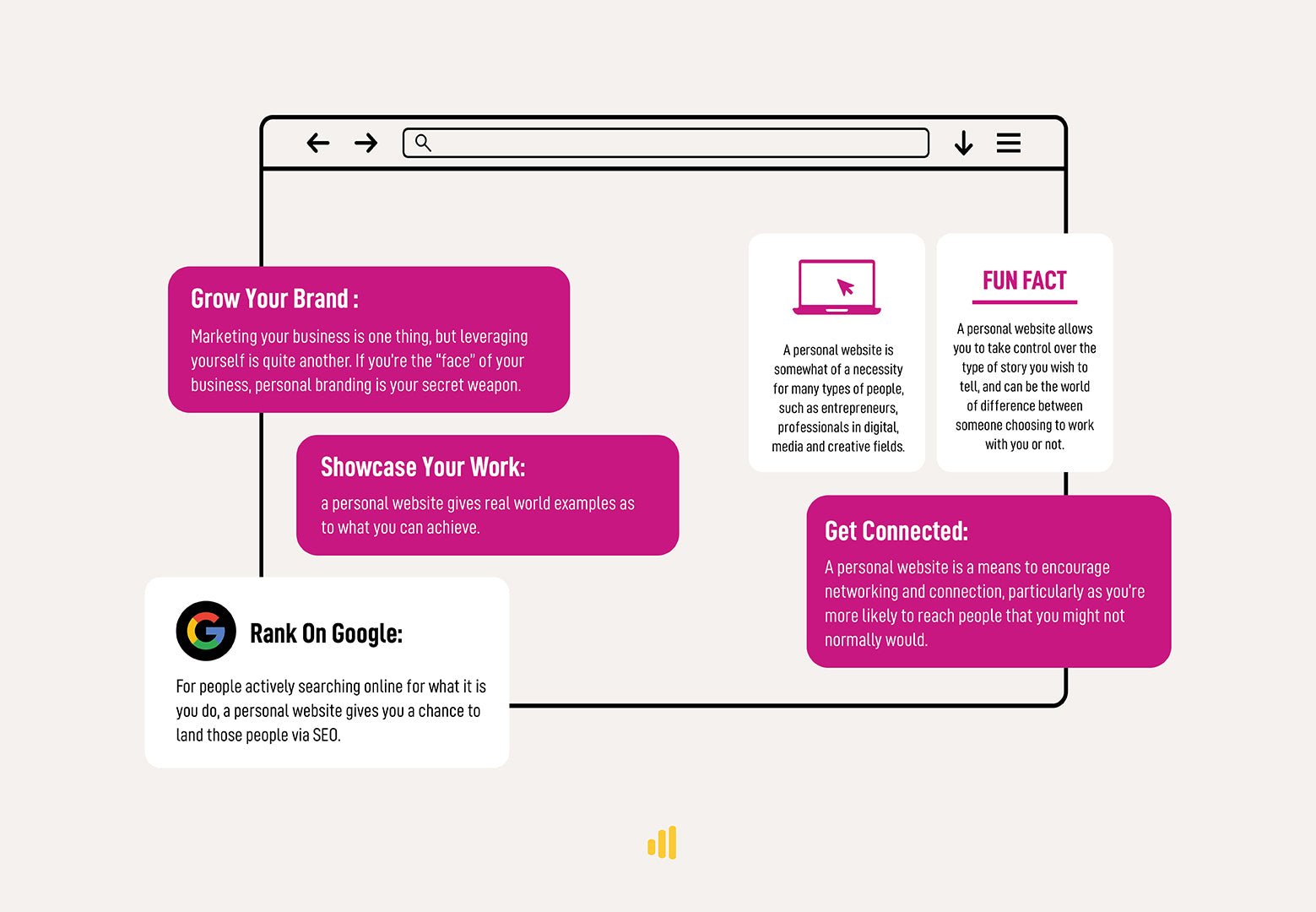If you’re trying to cement your status as an industry leader, a savvy social media presence isn’t always enough – which is why you need a personal website.
Personal branding is the conscious and intentional effort to create and influence public perception of an individual. This is done by positioning them as an authority in their industry, elevating their credibility, and differentiating themselves from the competition, to ultimately advance their career, increase their circle of influence, and have a larger impact.

The process of personal branding generally involves finding your uniqueness, building a reputation on the things you want to be known for, and then allowing yourself to be known for them. Ultimately, the goal is to create something that conveys a message and that can be monetised in the world of business.
However, even if you have no intention of establishing a brand with your face as the centrepiece, the simple reality is that whether you like it or not, your name is your brand. As such, having a personal website isn’t just for the likes of Oprah. Even if you wish to land a new gig as an employee, it’s still a means to exercise at least some control over your own narrative.
Five Reasons To Have A Personal Website
There are numerous perks linked to setting up a personal website. In fact, creating one is considered to be somewhat of a necessity for many types of people, such as entrepreneurs, professionals in digital, media, entertainment, and creative fields, and even those who are on the hunt for new employment.
Yet, many decline to claim their personal space on the web. For some people, it just feels unnecessary and even vain. However, it’s important to remember that your name holds a valuable piece of real estate on the world wide web. Whether you’re looking to land a new job or client, both will inevitably look you up online. A personal website allows you to take control over the type of story you wish to tell, and can be the world of difference between them choosing to work with you as opposed to someone else – but what are some of the other known benefits?
Grow Your Brand – Marketing your business is one thing, but leveraging yourself is quite another. If you’re the ‘face’ of your business, personal branding is your secret weapon. While you might be doing well with growth on social media platforms as a means to grow your brand, without a personal website, there’s nowhere for your audiences to go.
Showcase Your Work – Whether you’re a freelancer, own your own business, or work in an industry that requires a portfolio or even examples of your previous work, a personal website gives real world examples as to what you can achieve. While a resume talks about the things that you can do, a personal website shows visual examples.
Rank On Google – For people actively searching online for what it is you do, a personal website gives you a chance to land those people via SEO. Whether you’re a musician, graphic designer or even a social media manager, targeting these keywords alongside your name will help to ensure that the two are synonymous.
Highlight Your Reviews – Word of mouth is a powerful tool for marketing, but so is the word of people you have previously worked for. Testimonials, case studies and reviews from previous clients, co-workers and even your old bosses act as virtual ‘thumbs up’ to you, what you do, or the services you provide.
Get Connected – If you don’t promote yourself, nobody else will. If you manage to use your personal website as a means to do so, you never know who’s attention you might attract online. A personal website is a means to encourage networking and connection, particularly as you’re more likely to reach people that you might not normally.

The internet can be a tricky place to navigate even at the best of times, which is why both beginners and seasoned veterans use the frameworks available through various content management systems and website builder platforms such as Wix, Square Space and WordPress. While just about anyone can build a website using these systems, SEO is still key to getting seen online. If that’s not something you have the time, energy or resources to commit to, it’s worth considering your options with outsourcing.
The Key To Good SEO Is Great Content
Producing quality, consistent and on brand content that’s Google friendly takes time, effort, experience and resources – and you’re not alone if you can’t quite commit to that. Avoiding the use of content marketing altogether may actually be doing your brand a disservice, but thankfully – investing in a solid strategy has never been easier.
Here at Content Hive, producing top quality digital content is exactly what we do best. We have itemised a list of digital content services, and allocated credits next to each of these. This means that each month, you can use your credits with us to produce digital content such as social media posts, blog articles, videos and even animated Instagram stories.
We believe that this model means we can produce high quality content in faster than normal delivery times. It also means that because you have a monthly credit, you are going to want to make sure you use these up – and so do we – meaning that your digital content is always consistent.
If you aren’t quite sure where to start on your digital marketing journey and would like to speak to a professional, why not book a free discovery call with us at Content Hive today to discuss how we can get your brand buzzing online.


